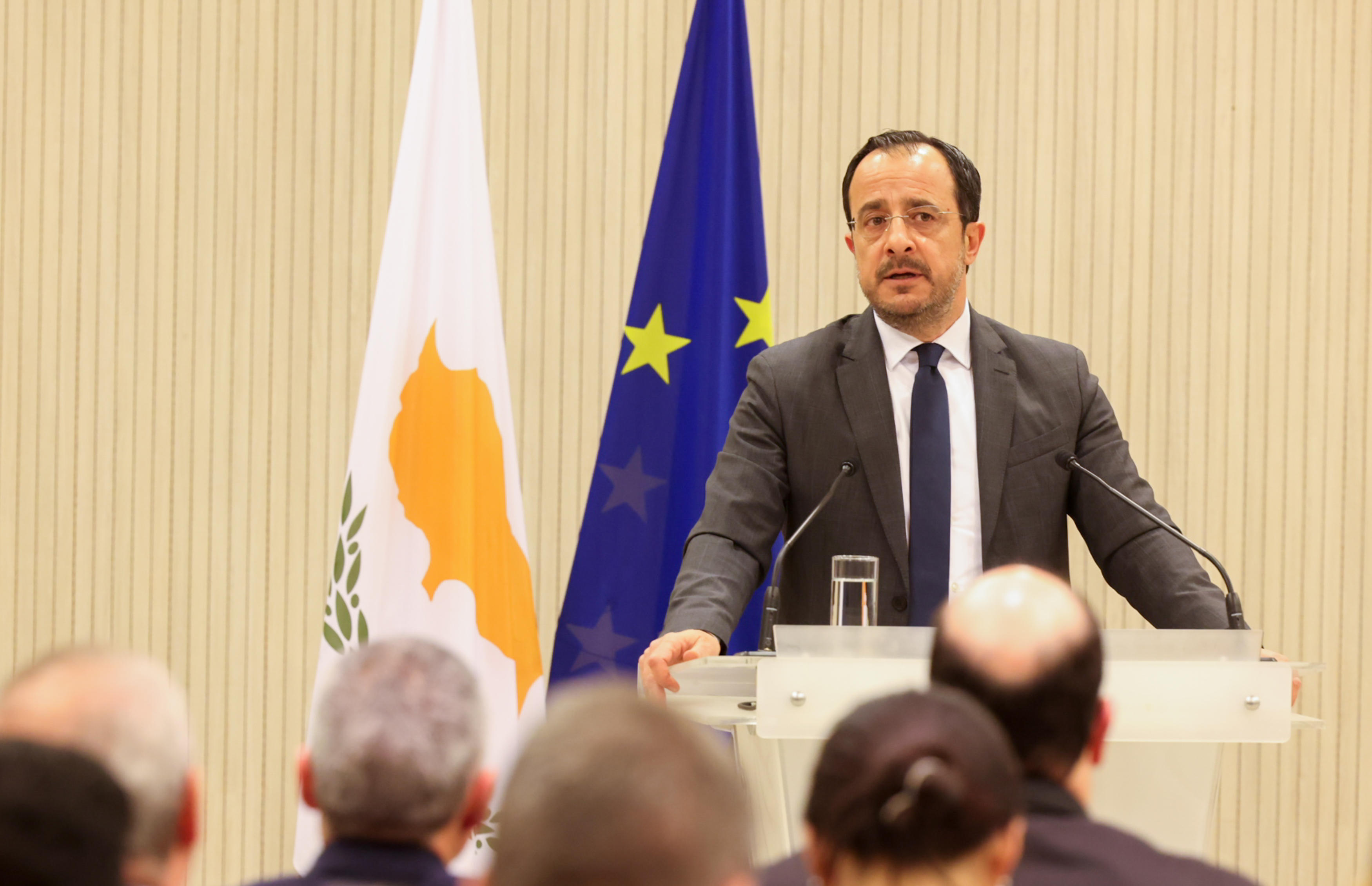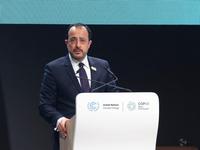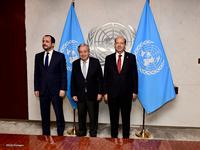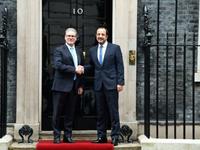Press Releases

09-01-2024 20:27
Address by the President of the Republic, Mr Nikos Christodoulides, at the event on United Nations and Human Rights, organised by the United Nations’ Association of Cyprus
At the outset, I wish to extend my appreciation to the President of the United Nations’ Association of Cyprus, Dr Christos Theodoulou, for organising today’s event on United Nations and Human Rights.
It is also with distinct pleasure that I welcome you here, at the Presidential Palace, a fact that is indicative of the significance that we all attach to the vital role of the United Nations.
On 24 October 2023 we marked the United Nations Day and the 78th anniversary of the entry into force of the United Nations’ Charter.
The establishment of the United Nations (UN) in 1945 created a platform for countries to engage, to resolve conflicts and to promote international peace, cooperation and prosperity. Born out of the devastation and the horror of the Second World War, the UN was, and still is, an indispensable forum for multilateral diplomacy, that facilitates dialogue with an aim to common challenges, promotes peace and stability, in line with the UN Charter, to which all members pledged commitment.
On 10 December 2023, we also marked the Human Rights’ Day and the 75th anniversary of the signing of the Universal Declaration of Human Rights in Paris, calling, for the first time, for fundamental human rights to be universally protected and upheld.
This landmark document was adopted by the newly formed UN in response to, and I quote from the preamble of article 1, “The barbarous acts which have outraged the conscience of mankind”. The Second World War provided the path that brought together Human Rights and peace.
Moreover, the drafters of the Universal Declaration of Human Rights were inspired by numerous and diverse thinkers and documents from around the world and human history. However, the Universal Declaration of Human Rights was unique in its kind, as it was the first expression of the rights and freedoms of every person, everywhere in the world.
In this regard, its universality was of ground-breaking significance. It enshrined the inalienable rights that everyone is entitled to as a human being - regardless of race, colour, religion, sex, language, political or other opinion, national or social origin, property, birth, or any other status. The Universal Declaration of Human Rights created a shared framework for the protection of human rights, and it forms an integral part of Human Rights Law. In this regard, it has greatly influenced the creation of the international treaties, conventions as well as domestic legislation. A very fitting example of this is the profound influence of the Universal Declaration of Human Rights on the European Union (EU) itself. The principles of the Universal Declaration of Human Rights have been instrumental in forming the EU’s Charter of Fundamental Rights and are at the core or EU’s legal structures and policies but also of its shared values, both internally but also in its relations with third countries.
It is therefore not an exaggeration to say that the Universal Declaration of Human Rights truly stands as a global road map to freedom and equality, defining, for the first time ever, human rights as the foundation for freedom, justice, and peace.
The commemorations of the United Nations Day and Human Rights Day provide us the opportunity to celebrate and take stock of what has been achieved so far. While on the one hand their commemoration offers an opportunity to remind ourselves of the strides that we have made since the Second World War in advancing, inter alia, the protection of human rights, human dignity, peace, and cooperation, at the same time, they offer the space to reflect and assess the challenges ahead, what remains to be achieved to truly fulfil the spirit and letter of these monumental documents.
Regrettably, as international developments reconfirm, as the recent geopolitical developments reconfirm, the principles of the Charter and the Universal Declaration continue to be partially or totally undermined, or disregarded. The pressure on human rights is evident and there are numerous examples where these inalienable rights continue to be violated, in many parts of the world. Regardless of the reasons that these human rights deficiencies are generated, be it climate change, social inequality, conflict and war, aggression, occupation, and regardless of the extent of these human rights violations, we all have the responsibility to continuously strive for the universal and without-exception application of the principles of the Charter and the Universal Declaration.
I strongly believe that in the current ever-changing geopolitical environment, the universality of human rights gains even greater importance. Assertions that human rights can be applied differently in different places of the world should be a thing of the past as we would all strive the make their universal application a stabilising force, a shared ethical foundation, that will transcend political, economic, and social landscapes.
On this day, we are all called to remind ourselves that the UN Charter and the Universal Declaration of Human Rights are our vital tools to build a better tomorrow for this generation, and for the generations that will come after us. In our continued efforts to reduce suffering, prevent conflict, combat injustice, we should remind everyone, but also ourselves, that human rights are neither a choice nor a privilege but rather an inherent right for all.
Today is also a staggering and somber reminder that human rights in Cyprus remain tragically an unfulfilled promise for all Cypriots, as a result of the occupation and the illegal invasion of Turkey in 1974, in continuous and persistent violation of the UN Charter, UN Security Council Resolutions (UNSC), International Human Rights and the EU law. Cypriots – Greek and Turkish Cypriots, Maronites, Armenians, and Latins – deserve the same human rights and fundamental freedoms as all other Europeans to prospect through co-existence and co-creation in a reunified country, where their human rights and fundamental freedoms are safeguarded and upheld in line with the Universal Declaration of Human rights and the EU’s Charter of Fundamental Rights.
In this regard, the United Nations, its Charter and the Universal Declaration of Human Rights, remain the most essential instruments we have at our disposal to reunify our country, in line with the relevant UN Security Council (UNSC) Resolutions.
There is a longstanding historic link of Cyprus and the United Nations. The United Nations have played and continue to play an important role through the peacekeeping mission, the UN Peacekeeping Force in Cyprus (UNFICYP) – the longest serving UN peacekeeping mission in the world – as well as through the UN Good Offices Mission in Cyprus.
At a time when peace in our region of the world is an urgent calling to all of us and a reminder that there are no frozen conflicts and that in the absence of lasting and viable peace, as prescribed by the UN Charter, peace in Cyprus would send a resounding message of peace in a region and a world that desperately needs it. The United Nations, upholding the principles of its Charter and UNSC have a vital role in facilitating the efforts to restart the negotiations, in order to end occupation and reunify Cyprus on the basis of the relevant UNSC Resolutions for a bicommunal and bizonal federation with political equality.
I have repeatedly stated my commitment to taking all the steps necessary to resume the negotiations process so that eventually we will be able to enjoy a peaceful, prosperous and united Cyprus.
I am confident that the UN, also through the Good Offices of the Secretary General as well as the newly appointed UN Secretary General’ s personal envoy, will continue to be our partners for peace and for safeguarding the human rights of all Cypriots.
(RM/MS/IA)
Relevant Press Releases







